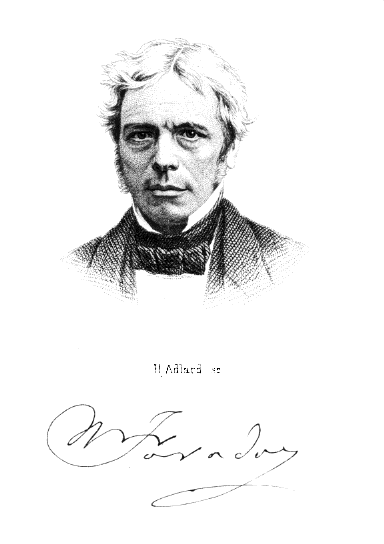Rest needed--visit to Switzerland.
Rest needed
visit to Switzerland.
The last of these memoirs was dated from the Royal Institution in June, 1838. It concludes the first volume of his 'Experimental Researches on Electricity.' In 1840, as already stated, he made his final assault on the Contact Theory, from which it never recovered.1
He was now feeling the effects of the mental strain to which he had been subjected for so many years. During these years he repeatedly broke down. His wife alone witnessed the extent of his prostration, and to her loving care we, and the world, are indebted for the enjoyment of his presence here so long. He found occasional relief in a theatre. He frequently quitted London and went to Brighton and elsewhere, always choosing a situation which commanded a view of the sea, or of some other pleasant horizon, where he could sit and gaze and feel the gradual revival of the faith that'Nature never did betrayBut very often for some days after his removal to the country, he would be unable to do more than sit at a window and look out upon the sea and sky.
The heart that loved her.'
In 1841, his state became more serious than it had ever been before. A published letter to Mr. Richard Taylor, dated March 11, 1843, contains an allusion to his previous condition. 'You are aware,' he says, 'that considerations regarding health have prevented me from working or reading on science for the last two years.' This, at one period or another of their lives, seems to be the fate of most great investigators. They do not know the limits of their constitutional strength until they have transgressed them. It is, perhaps, right that they should transgress them, in order to ascertain where they lie. Faraday, however, though he went far towards it, did not push his transgression beyond his power of restitution. In 1841 Mrs. Faraday and he went to Switzerland, under the affectionate charge of her brother, Mr. George Barnard, the artist. This time of suffering throws fresh light upon his character. I have said that sweetness and gentleness were not its only constituents; that he was also fiery and strong. At the time now referred to, his fire was low and his strength distilled away; but the residue of his life was neither irritability nor discontent. He was unfit to mingle in society, for conversation was a pain to him; but let us observe the great Man-child when alone. He is at the village of Interlaken, enjoying Jungfrau sunsets, and at times watching the Swiss nailers making their nails. He keeps a little journal, in which he describes the process of nailmaking, and incidentally throws a luminous beam upon himself.
'August 2, 1841.--Clout nailmaking goes on here rather considerably, and is a very neat and pretty operation to observe. I love a smith's shop and anything relating to smithery. My father was a smith.'
From Interlaken he went to the Falls of the Giessbach, on the pleasant lake of Brientz. And here we have him watching the shoot of the cataract down its series of precipices. It is shattered into foam at the base of each, and tossed by its own recoil as water-dust through the air. The sun is at his back, shining on the drifting spray, and he thus describes and muses on what he sees:--
'August 12, 1841.--To-day every fall was foaming from the abundance of water, and the current of wind brought down by it was in some places too strong to stand against. The sun shone brightly, and the rainbows seen from various points were very beautiful. One at the bottom of a fine but furious fall was very pleasant,--there it remained motionless, whilst the gusts and clouds of spray swept furiously across its place and were dashed against the rock. It looked like a spirit strong in faith and steadfast in the midst of the storm of passions sweeping across it, and though it might fade and revive, still it held on to the rock as in hope and giving hope. And the very drops, which in the whirlwind of their fury seemed as if they would carry all away, were made to revive it and give it greater beauty.'

| Previous chapter | Back | Home | Email this | Search | Discuss | Next chapter |